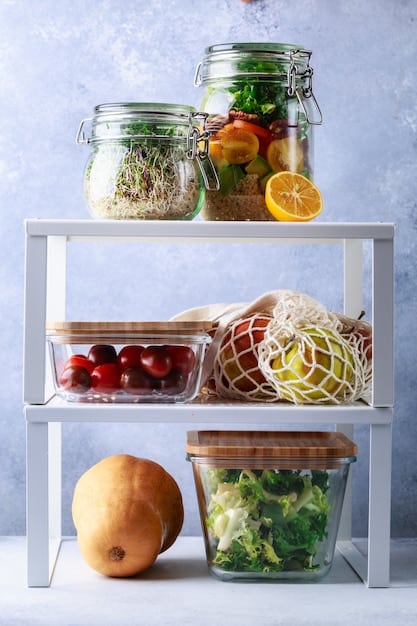Slash Your Grocery Bill by 20%: Smart Budgeting in Australia

Want to slash your grocery bill by 20%? This article provides smart budgeting tips tailored for Australian families, focusing on meal planning, savvy shopping, reducing food waste, and leveraging loyalty programs to achieve significant savings.
Aussie families are feeling the pinch with rising grocery prices. But what if you could slash your grocery bill by 20% without sacrificing quality or taste? It’s more achievable than you might think!
Crafting a Budget-Friendly Meal Plan
Meal planning is the cornerstone of any successful grocery budget. Taking the time to plan your meals for the week not only saves you money but also reduces stress and prevents impulse buys at the supermarket.
Start with What You Have
Before you even think about heading to the shops, take inventory of your pantry, fridge, and freezer. Use up ingredients you already have on hand to minimise waste and create a base for your meal plan.
Plan Around Sales and Specials
Check your local supermarket catalogues and online resources for weekly specials. Plan your meals around discounted items to maximise your savings.
- Use a Digital Calendar: Schedule meals and track leftover usage.
- Theme Your Nights: “Taco Tuesday” or “Pasta Wednesday” simplifies planning.
- Batch Cook on Weekends: Prepare components or entire meals for the week.
By creating a detailed meal plan, you’ll not only save money but also eat healthier and reduce food waste. This foundation is crucial for staying within your budget.
Smart Shopping Strategies for Australian Supermarkets
Once you have your meal plan in place, it’s time to hit the supermarket armed with a list and a strategy. Avoid impulse buys and stick to your plan to keep your budget on track.
Shop During Off-Peak Hours
Shopping when the supermarket is less crowded allows you to take your time, compare prices, and avoid impulse buys. Weekday mornings or late evenings are often quieter.
Embrace Generic Brands
Generic or store-brand products are often just as good as name brands but at a fraction of the cost. Don’t be afraid to try generic alternatives for staples like pasta, rice, and canned goods.

- Compare Unit Prices: Check the price per unit (e.g., per kilogram or per litre) to find the best value.
- Use a Calculator: Calculate the total cost before you reach the checkout.
- Look for Clearance Items: Check for discounted items that are nearing their expiration date.
These savvy shopping strategies can significantly reduce your grocery bill without compromising on quality. Being prepared and making informed choices are key.
Minimising Food Waste: Tips for Aussies
Food waste is a major contributor to household expenses. By implementing strategies to minimise waste, you’ll not only save money but also reduce your environmental impact.
Store Food Properly
Proper food storage is essential for preserving freshness and preventing spoilage. Use airtight containers, wrap vegetables tightly, and store food at the correct temperature.
Love Your Leftovers
Transform leftovers into new meals or freeze them for future use. Get creative with leftover roast chicken or vegetables to avoid waste.
Understand Expiration Dates
Learn the difference between “use by” and “best before” dates. “Best before” dates indicate quality, not safety, so food may still be safe to eat after that date.

Reducing food waste requires awareness and a commitment to using what you have. These simple tips can make a big difference in your grocery bill and your conscience.
Leveraging Loyalty Programs and Discounts
Supermarket loyalty programs and discounts can provide significant savings over time. Sign up for programs and take advantage of coupons and special offers.
Join Supermarket Loyalty Programs
Most major supermarkets in Australia offer loyalty programs that provide discounts, points, and exclusive offers. Sign up for these programs and scan your card every time you shop.
Use Coupons and Vouchers
Collect coupons and vouchers from newspapers, magazines, and online sources. Many supermarkets also offer digital coupons that you can load onto your loyalty card.
- Stack Discounts: Combine loyalty points with coupons for maximum savings.
- Shop During Double Points Days: Earn bonus points on your purchases.
- Read the Fine Print: Understand the terms and conditions of each offer.
Loyalty programs and discounts are a valuable tool for saving money on groceries. Take the time to research and utilise these opportunities to reduce your expenses.
Growing Your Own: Sustainable Savings at Home
Consider growing your own herbs, vegetables, or fruits at home. Even a small garden can provide fresh, affordable produce and reduce your reliance on supermarket purchases.
Start Small with Herbs
Herbs are easy to grow in pots or containers and can add flavour to your meals. Basil, mint, and parsley are popular choices.
Grow Your Own Vegetables
Tomatoes, lettuce, and zucchini are relatively easy to grow in a home garden. Start with seedlings or seeds and provide adequate sunlight and water.
- Join a Community Garden: Share resources and knowledge with other gardeners.
- Compost Food Waste: Create nutrient-rich soil for your plants.
- Save Seeds: Collect seeds from your plants to replant next season.
Growing your own food is a sustainable and rewarding way to save money on groceries. It also provides fresh, healthy produce for your family.
Budgeting Apps and Tools for Grocery Savings
Utilise budgeting apps and online tools to track your spending, compare prices, and find deals on groceries. These resources can help you stay organised and make informed decisions.
Track Your Spending
Use a budgeting app to track your grocery expenses and identify areas where you can cut back. Set a budget and monitor your progress throughout the month.
Compare Prices Online
Use online tools to compare prices at different supermarkets and find the best deals on groceries. Many websites and apps provide price comparisons and exclusive offers.
Meal Planning Apps
Explore meal planning apps that offer recipe suggestions, shopping lists, and budgeting features. These apps can help you create a meal plan that fits your budget and dietary needs.
Budgeting apps and tools can simplify the process of saving money on groceries. By tracking your spending and comparing prices, you can make informed decisions and stay within your budget.
| Key Tip | Brief Description |
|---|---|
| 🗓️ Meal Planning Mastery | Plan meals weekly, use what you have, and adapt to sales. |
| 🛒 Smart Shopping Savvy | Shop off-peak, embrace generic brands, and compare unit prices. |
| ♻️ Waste Reduction Wins | Store food correctly, love leftovers, and understand expiration dates. |
| 🌱 Grow Your Own Goodies | Start a herb garden or grow vegetables to save on fresh produce. |
Frequently Asked Questions
▼
Start by tracking your current spending for a month to understand where your money is going. Then, identify areas where you can cut back, set a realistic limit, and track your progress using budgeting apps or spreadsheets.
▼
In many cases, yes. Generic brands often come from the same manufacturers as name brands but are sold at a lower price. Try generic alternatives for staples like pasta, rice, and canned goods to save money.
▼
Store fruits and vegetables in the crisper drawer of your refrigerator. Wrap leafy greens in a damp paper towel, and keep herbs in a glass of water like flowers. Use airtight containers for cut produce.
▼
Always scan your loyalty card when you shop to earn points and discounts. Keep an eye out for special offers and bonus points days. Also, consider signing up for the supermarket’s email list to receive exclusive coupons and promotions.
▼
Plan your meals, store food properly, and love your leftovers. Use up ingredients before they expire, and get creative with leftover recipes. Compost food scraps to reduce waste and create nutrient-rich soil for your garden.
Conclusion
By implementing these smart budgeting tips, Australian families can slash their grocery bill by 20% and enjoy significant savings. From meal planning to savvy shopping and reducing food waste, every small step contributes to a healthier budget and a more sustainable lifestyle.





